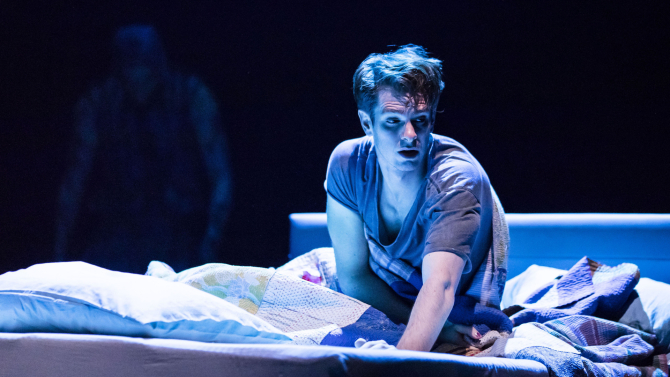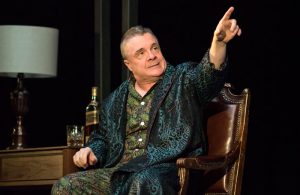
Angels in America at the National Theatre in London. Presented live in movie theaters by Fathom Events in July 2017. Encore dates to be announced.
This article is based on my reviews that were published in DC Metro Theater Arts
Angels in America remains a sad, hilarious, hallucinogenic theatrical achievement. The juxtaposition of those seemingly-opposite qualities is what makes the play memorable.
We observed this when an ambitious new production by the National Theatre was streamed to cinemas in HD. That production is in the midst of a sold-out run in London.
In the 1990s, Angels in America came across as a polemic by gay men who were frightened by the death sentence of AIDS. Now that sexual differences are somewhat more accepted, and many people live with AIDS for years, we look for additional subject matter, which Tony Kushner’s text does supply.
Kushner’s play is certainly long, in two parts totalling eight hours, but it’s worth taking the time to savor his colloquies about politics, religion, loyalty, guilt, and peoples’ failure to live up to expectations. This is more a fantasy than it is a narrative; Kushner’s ruminations are more important than the specifics of what happened and when. It’s subtitle, appropriately, is A Gay Fantasia on National Themes, with an accent on fantasia.
To reduce the plot to its bare bones, two men are dying of AIDS. Both are gay, but they are polar opposites. One is the fictional Prior Walter, a proud member of New York’s gay community; the other is the real and infamous right-wing attorney Roy Cohn, who denies that he’s gay. A romance ensues between the protégée of Cohn and the ex-lover of Prior.
Angels is wordy but it has hardly any soliloquies where a character reveals his inner thoughts to the audience. Instead, almost all of the talk is in conversations between the garrulous characters. One prominent exception is the opening solo eulogy at the funeral of the grandmother of one of the leading players, which a rabbi addresses to assembled un-seen mourners.
This is an important moment, because the rabbi stresses the significance of the journey the old woman made from Europe many years before; a great journey which portends the journey which the characters are going to undertake, and a journey — a transformation — which Kushner calls upon America to make. Later in the play, the narrative of pioneer Mormons crossing the prairie provides a link with the immigrant European Jews making their trans-Atlantic journey.
The outstanding revelations in this production include the acting of Andrew Garfield, the British-American film star who plays Prior. As he reveals that he has AIDS, Garfield is intense with fluttering hands to indicate his panic; and Nathan Lane playing Cohn, the closeted gay man who died of AIDS while insisting he didn’t have it. Lane gives the ruthless Cohn a bit more humanity than others have in earlier productions, and his interpretation reveals subtleties that make the story more interesting.
Another asset is Denise Gough playing the valium-addicted Harper Pitt with more strength than previous interpreters. Also excellent are James McArdle as the talkative Louis Ironson who is wracked with guilt about leaving his lover when his presence was most needed, and the droll Nathan Stewart-Jarrett as a drag queen nurse, a black man who is a target for Cohn’s vicious verbal attacks.
The one major actor who disappoints is Russell Tovey as Joe Pitt — married, Mormon, a closeted gay attorney whom Roy Cohn recruits to be his henchman inside the Justice Department. His long-denied sexuality is the cause for his wife’s terrors and addictions. Tovey plays Joe earnestly, but sounds like he’s reading lines rather than being a flesh-and-blood person.
Director of this production is Marianne Elliott, who was visually innovative with her stagings of War Horse and The Curious Incident of the Dog in the Night-Time. Her work here is conventional. Action is set in cubicles outlined with neon tubes (designed by Ian MacNeil) and they move back and forth, apparently to illustrate the connections between characters. The arrival of an angel from above is less impressive here than other productions we’ve seen.
Some critics think that Kushner’s script is too verbose, but I revel in his poetic digressions. I do find the double casting of certain roles to be disconcerting, even though this also was done in the original production. A female actress plays a rabbi (who, in that time, would unlikely be female) and Cohn’s doctor Henry (whom Cohn would never allow to be female), and a Justice Department attorney named Martin, whose character is absurd when it is feminized. Kushner no doubt wanted to spotlight the errors of gender expectations, but it distracts from the drama.
Also, the actresses who played Joe’s mother and her real-estate agent, from Utah, have terribly inauthentic accents. This is particularly egregious when you compare their speech to the perfect American accents of the Irish-born Gough and the Scottish-born McArdle.
With its examination of intolerance and religious hypocrisy, Angels in America is still pertinent. In one of many parallels to our time, Cohn’s crony exults that “It’s really the end of liberalism. The end of New Deal socialism. The end of ipso facto secular humanism. The dawning of a genuinely American political personality.”
Some theatergoers shy away from the play’s fantastic elements. But each of these scenes has a purpose. For instance, Harper’s delusional trip to Antarctica gives the playwright opportunity to discuss the ozone layer and other environmental issues (and this, presciently, was written in 1990). Then a visit to heaven allows Kushner to propound a clash between passive acceptance and a return to reality where one can deal with painful issues.
Kushner, a non-religious Jew, seems to be saying that the idea of heaven is all well and good but what’s more important is to stay on earth as long as one can, and continue to fight against illness and injustice.
Dramatic confrontations in Part Two are combative, such as Prior’s disputatious reunion with Louis, Cohn’s bullying of his drag-queen nurse, and Cohn’s excruciating death scene where the ghost of Ethel Rosenberg gets the last laugh at the manipulator who intervened with a judge to insure that Ethel was electrocuted. It’s worth remembering that Ethel and her husband were convicted for passing secrets to Russia, but there was a mitigating factor because Russia was America’s ally in World War II, not an enemy nation. Cohn, however, was hostile to any clemency, and he prevailed.
Sparks fly during each of those confrontations, and there’s sassy humor. The acting of Garfield, Lane and McArdle rise to eloquent heights. Garfield in particular is haunting and spellbinding.
One relatively minor concern is Amanda Lawrence’s appearance as The Angel. I don’t like to pick on actors for their looks, but I’m disturbed that the director chose this actress who appears skinny and homely whereas she is supposed to be so voluptuous and seductive that Prior, even though he’s gay, gets erections and ejaculates whenever he sees her. It’s in the script.
Below, Nathan Lane as Cohn:
